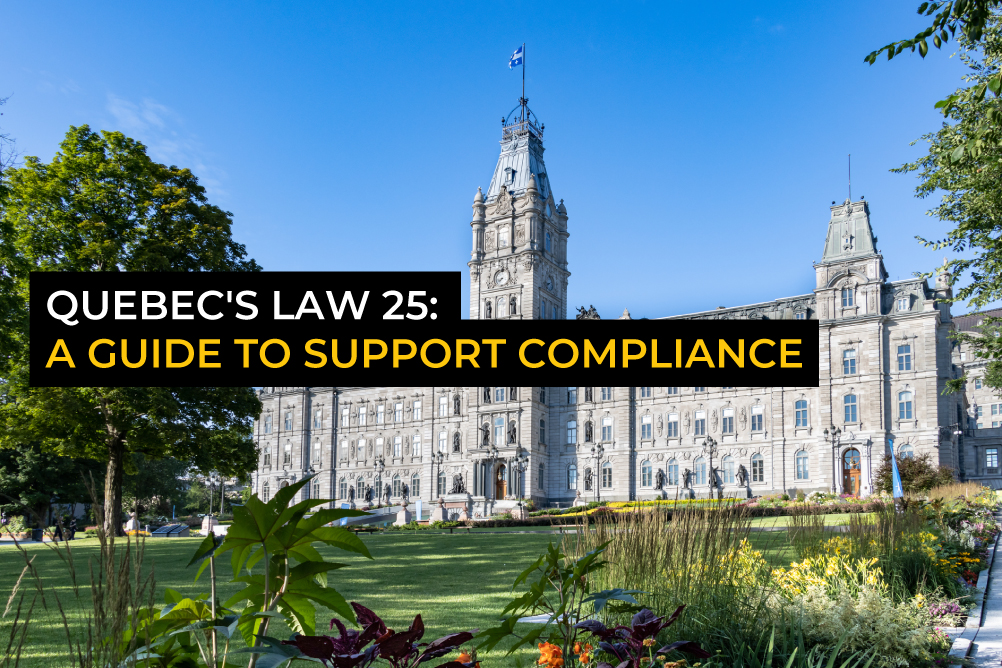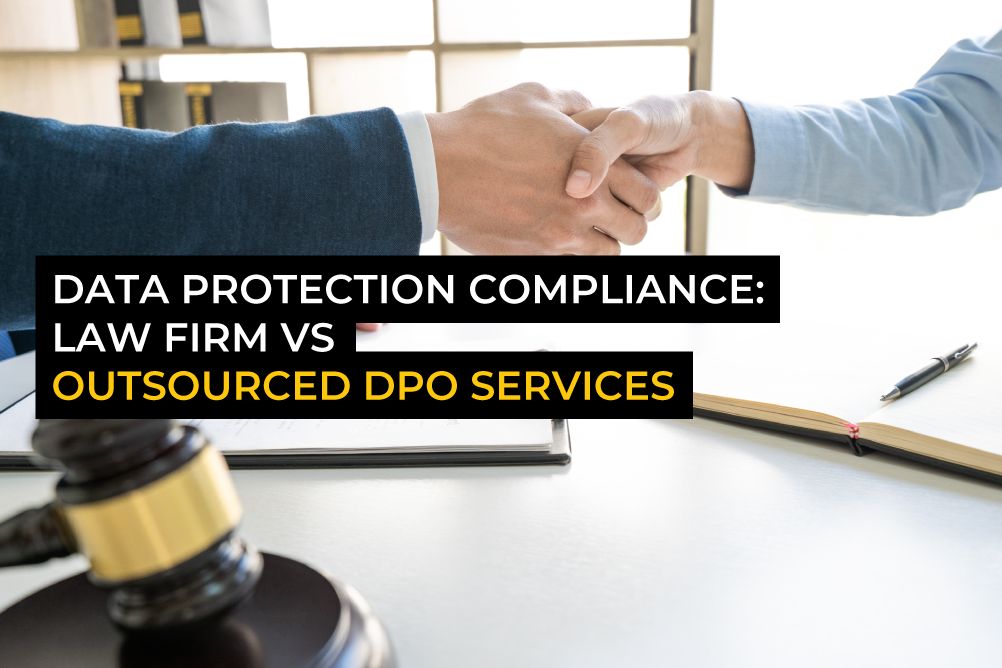- Contact The DPO Centre
- +44 (0)203 797 1289
- hello@dpocentre.com

Data protection checklist for mergers and acquisitions
April 29, 2024
Canadian privacy laws: PIPEDA and beyond
May 27, 2024Quebec’s Law 25: A guide to support compliance

Organisations that collect, processA series of actions or steps taken in order to achieve a particular end. and store the personal information of Quebec individuals must ensure their existing privacy programs are in line with the provisions of Quebec’s Law 25. This new law was adopted in September 2021 and has been implemented in stages, with the final stage coming into effect on September 22, 2024.
Law 25 represents a milestone for provincial privacy legislation. It marks a complete overhaul of Quebec’s privacy regime, strengthening privacy rights for individuals and updating organisational requirements.
In this guide, we provide essential information to help support your journey towards achieving and maintaining compliance. We explain who Law 25 affects and detail what each stage of its provisions include.
What is Quebec’s Law 25?
Law 25 introduces several key concepts to modernise data protection practices in Quebec and strengthen privacy rights for individuals.
The legislation has been brought into effect in stages, over a three-year period, which has allowed organisations to adapt gradually to the new privacy requirements. By September 2024 organisations should ensure all provisions are fully implemented.
Fines for non-compliance can range between CA$15,000 and CA$25,000,000 (approx €10,150 to €16,900,000) or 4% of worldwide turnover for the previous year, whichever is greater.
Who does Law 25 apply to?
Law 25 applies to all businesses, including non-profits, that collect, process, use, or disclose the data of Quebec residents, regardless of size, revenue, or location of the business.
Quebec’s Law 25: A guide to support compliance
Law 25 imposes a range of obligations on businesses, with the aim of striking a balance between privacy protection, individual rights, and business accountabilityPerhaps the most important GDPR principle, which requires controllers to take responsibility for complying with the GDPR and, document their compliance..
To ensure compliance with the new regulations, you should complete a gap analysis of your current privacy programmes. This will identify any required updates that need to be made to your current policies, procedures and data handling practices.
If you are operating within the province of Quebec and process personal dataInformation which relates to an identified or identifiable natural person., these are the important aspects you should already have in place or need to address by September 22, 2024:
Appoint a Data Privacy Officer
The Data Privacy Officer role shares a similarity with the EU’s requirement for a Data Protection Officer (DPO). However, unlike the GDPR, the Privacy Officer role defaults to the highest-ranking individual in an organisation, if one is not otherwise appointed.
Many organisations may not be aware of the defaulting nature of the Privacy Officer role. Where a Privacy Officer is not explicitly appointed, the responsibility falls to the CEO or MD.
What you need to do: It is crucial for organisations of any size or industry sector to recognize the importance of this role. A Privacy Officer should have the expertise and specialist knowledge to ensure compliance with privacy laws and understand the complexities of global data protection legislation.
- Appoint an in-house Privacy Officer or outsource to an external professional
Breach reporting
Organisations must ensure that breach management processes are in place. Data breaches must be reported to the Commission d’accès à l’information (CAI) and all affected individuals as soon as possible.
What you need to do: Create and test a data breach responseAn organisation's procedure or approach for recording, investigating, containing and mitigating a personal data breach. protocol. When identifying a potential data breach, you must assess whether an incident poses a “risk of serious injury” based on information sensitivity, anticipated consequences and likelihood of harmful use.
Your data breach response protocol should include:
- Employee roles and responsibilities
- Workflows
- Template breach reporting document
Biometrics disclosure
Biometric data collection includes physical features such as fingerprints, facial features and iris patterns.
What you need to do:
- Express consentAn unambiguous, informed and freely given indication by an individual agreeing to their personal data being processed. requirements – Obtain express consent from individuals and ensure it is specific to the purpose of collecting and using biometrics
- Disclosure requirements – Inform the Commission d’accès à l’information (CAI) of your intention to use biometric processes at least 60 days before implementing the biometric system
- Privacy by Design – Implement privacy-enhancing measures when handling biometric data and consider Privacy Impact Assessments (PIAs) to mitigate any potential harms
Privacy Policy
All organisations operating in Quebec must have a comprehensive Privacy Policy that outlines data handling practices.
What you need to do: Create a Privacy Policy to include these important details:
- Purpose – Clearly state the purpose of your privacy policy and outline how your organisation collects, uses, discloses and protects personal information
- Scope – Specify that the policy applies to all individuals whose data you process
- Type of information – For example names, addresses, credit card numbers
- Security measures – For example, encryption, access controlsA series of measures (either technical or physical) which allow personal data to be accessed on a need-to-know basis., regular audits, and employee training
- Third parties and sharing – Explain the purpose of any such sharing and ensure transparency
- Individual rights – Inform individuals of their rights and provide instructions on how they can exercise these rights
- Contact information – For inquiries, requests and complaints related to privacy, include details of the designated Data Privacy Officer
- Updates and accessibility – Commit to keeping the Privacy Policy up to date and ensure it is easily accessible and in a prominent place on your website
Privacy Impact Assessment (PIA)
A PIA is a systematic process to evaluate the impact of data processing activities on individuals’ privacy rights.
What you need to do: .
Under Law 25, organisations must conduct a Privacy Impact Assessment (PIA) for:
- High risk data processing activities (e.g., large-scale data collection, profiling, biometrics)
- Data transfers to other provinces, third countriesCountries that are not part of the European Economic Area (EEA)., or international organisations
- Implementation of new technologies (e.g., AI, IoT, facial recognition)
Cross-border transfers
These are transfers that involve moving personal data from Quebec to another jurisdiction outside Canada (or to another province).
What you need to do:
- Inform individuals about cross-border transfers in your Privacy Policy
- Undertake a PIA (see details in the section above)
- Enact contractual safeguardsWhen transferring personal data to a third country, organisations must put in place appropriate safeguards to ensure the protection of personal data. Organisations should ensure that data subjects' rights will be respected and that the data subject has access to redress if they don't, and that the GDPR principles will be adhered to whilst the personal data is in the... to ensure adequate protection in the jurisdiction of transferThe movement of data from one place to another. This could be, for example, from one data controller to another, or from one jurisdiction to another.
Enhanced Consent
Law 25 sets stricter rules for acquiring permission before using people’s personal information. Organisations must obtain explicit opt-in consent before collecting, storing, processing, and sharing personal information. Additionally, for children under 14, you will need the parent’s permission first.
What you need to do:
- Provide comprehensive information about why and how their data will be used
- Ensure the consent request is prominant and stands out from general terms and conditions
- Use clear and concise language with an opt-in requirement
- Inform individuals of their right to withdraw consent at any time
- List any non-Quebec third parties that you are sharing the personal information with
- Maintain documentation of how and when consent was given
Data minimization
Law 25 emphasises the importance of collecting only the essential data for the intended purpose. Organisations must avoid excessive data collection and retain only relevant information.
What you need to do:
- Clearly define the purpose for which the data will be used in your privacy policy
- Then only collect the minimum amount of data required to achieve that purpose
- Define clear retentionIn data protection terms, a defined period of time for which information assets are to be kept. periods for different types of data
Subject rights
These rights came into effect September 2023, with the right to data portability effective in September 2024 (see below section).
Subject rights include:
- Right to be informed
- Right to access
- Right to rectification
- Right to erasureA qualified right under the GDPR allowing for data subjects to request that their personal data be erased (subject to exemptions).
- Right to withdraw consent
- Right to restrict processing
- Right to data portability
What you need to do:
- Ensure individuals are informed about your data practices
- Privacy Officers should respond promptly to any access requests, within 30 days, and provide the relevant details (with redactions, as necessary)
Data portability rights – comes into effect September 2024
With this specific area of Law 25, individuals have the right to have their personal data seamlessly transitioned between service providers.
What this means is that you are obliged to provide the requested information in a specified format.
What you need to do:
- You must provide the individual’s personal data in a structured, commonly used, and machine-readable format
- Share the requested information with any authorized person or organisation
Summary
The final stage of Quebec’s Law 25 comes into effect on September 22, 2024.
Organisations operating within the province of Quebec must implement the necessary operational and procedural changes by that date to ensure compliance with the new regulations.
We covered the key aspects of Law 25 in the above sections, but these are the main elements to consider:
- All organisations must have a Privacy Officer in place
- If you don’t specify a Privacy Officer, the CEO/MD will be automatically assigned
- Complete a Privacy Impact Assessment (PIA) for all data transfers and new technologies
- Implement a robust breach notification protocol with workflows and reporting documents
The DPO Centre Canada
From our offices in Toronto, Ontario, The DPO Centre Canada provides outsourced Canadian Privacy Officers to organisations operating across Quebec and other provinces.
If you would like to discuss how our range of specialist services can support your organisation’s privacy governance, please contact The DPO Centre Canada.
Fill in your details below and we’ll get back to you as soon as possible



